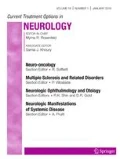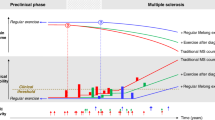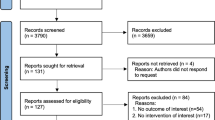Abstract
Purpose of review
There has been recent interest in the role of lifestyle and wellness-based approaches in the treatment and management of multiple sclerosis (MS). These approaches may be particularly relevant for patients with progressive MS, considering limited therapeutic options currently available. The purpose of this review is to examine the role of wellness-based interventions including exercise training, emotional well-being therapies, and dietary modification in patients with progressive MS.
Recent findings
We conducted a literature search on the efficacy of wellness-based interventions in patients with progressive MS published between 1985 and July 2017. The level of evidence for each trial was evaluated using the American Academy of Neurology criteria. Overall, 21 articles reporting on 16 wellness-based interventions were identified: ten trials involved exercise training, three involved emotional wellness therapies, two involved dietary modification, and one was a combined wellness intervention.
Summary
There is level C evidence (possibly effective; one class II study) for the efficacy of aerobic exercise training on cardiorespiratory fitness in patients with progressive MS. There is level B evidence (probably effective; one class I study) for the efficacy of mindfulness training on psychological distress, depression, anxiety, pain, and quality of life in patients with progressive MS. There is inadequate evidence (level U) for efficacy of dietary modification (one class III study and one class IV study) and combined wellness interventions involving exercise training, meditation, and dietary modification (one class IV study). High-quality research is needed to provide evidence-based recommendations for wellness behaviors and lifestyle change in patients with progressive MS.
Similar content being viewed by others
References and Recommended Reading
Papers of particular interest, published recently, have been highlighted as: • Of importance •• Of major importance
Compston A, Coles A. Multiple sclerosis. Lancet. 2008;372:1502–17.
Lublin FD, Reingold SC, Cohen JA, Cutter GR, Sørensen PS, Thompson AJ, et al. Defining the clinical course of multiple sclerosis: the 2013 revisions. Neurology. 2014;83:278–86.
Antel J, Antel S, Caramanos Z, Arnold DL, Kuhlmann T. Primary progressive multiple sclerosis: part of the MS disease spectrum or separate disease entity? Acta Neuropathol. 2012;123:627–38.
Scalfari A, Neuhaus A, Daumer M, Muraro PA, Ebers GC. Onset of secondary progressive phase and long-term evolution of multiple sclerosis. J Neurol Neurosurg Psychiatry. 2014;85:67–75.
Giovannetti AM, Giordano A, Pietrolongo E, Confalonieri P, De Luca G, Tortorella C, et al. Managing the transition (ManTra): a resource for persons with secondary progressive multiple sclerosis and their health professionals: protocol for a mixed-methods study in Italy. BMJ Open. 2017;7:e017254.
Fox R, Thompson A, Baker D, Baneke P, Brown D, Browne P, et al. Setting a research agenda for progressive multiple sclerosis: the international collaborative on progressive MS. Mult Scler. 2012;18:1534–40.
• Miller DH, Thompson AJ. Advancing trial design in progressive multiple sclerosis. Mult Scler. 2017;23:1571–2. This publication provides an overview of recommendations for advancing the design of clinical trials in patients with progressive MS
International Progressive MS Alliance [cited 2017 Nov 9]. Available from: http://www.progressivemsalliance.org/
• Motl RW, Mowry EM, Ehde DM, LaRocca NG, Smith KE, Costello K, et al. Wellness and multiple sclerosis: the National MS Society establishes a Wellness Research Working Group and research priorities. Mult Scler. 2017; https://doi.org/10.1177/1352458516687404. This paper reports on the development of a wellness research agenda by the MS Wellness Research Working Group
Moss BP, Rensel MR, Hersh CM. Wellness and the role of comorbidities in multiple sclerosis. Neurother J Am Soc Exp Neurother. 2017;14:999–1017. https://doi.org/10.1007/s13311-017-0563-6.
Dunn M, Bhargava P, Kalb R. Your patients with multiple sclerosis have set wellness as a high priority—and the National Multiple Sclerosis Society is responding. US Neurol. 2015;11:80.
Multiple Sclerosis Society of Canada. MS Wellness Survey; 2015 [cited 2017 Oct 5]. Available from: https://mssociety.ca/ms-wellness-survey
Haselkorn JK, Hughes C, Rae-Grant A, Henson LJ, Bever CT, Lo AC, et al. Summary of comprehensive systematic review: rehabilitation in multiple sclerosis: report of the guideline development, dissemination, and implementation subcommittee of the American Academy of Neurology. Neurology. 2015;85:1896–903.
•• Briken S, Gold SM, Patra S, Vettorazzi E, Harbs D, Tallner A, et al. Effects of exercise on fitness and cognition in progressive MS: a randomized, controlled pilot trial. Mult Scler. 2014;20:382–90. This RCT reported that 8–10 weeks of aerobic exercise training improves aerobic fitness, walking endurance, symptoms of fatigue and depression, and some cognitive outcomes in patients with progressive MS.
Briken S, Rosenkranz SC, Keminer O, Patra S, Ketels G, Heesen C, et al. Effects of exercise on Irisin, BDNF and IL-6 serum levels in patients with progressive multiple sclerosis. J Neuroimmunol. 2016;299:53–8.
• Skjerbæk AG, Næsby M, Lützen K, Møller AB, Jensen E, Lamers I, et al. Endurance training is feasible in severely disabled patients with progressive multiple sclerosis. Mult Scler. 2014;20:627–30. This RCT reports that vigorous intensity aerobic exercise is safe in persons with progressive MS with severe mobility impairment, and may improve aerobic fitness.
Fornusek C, Hoang P. Neuromuscular electrical stimulation cycling exercise for persons with advanced multiple sclerosis. J Rehabil Med. 2014;46:698–702.
Giesser B, Beres-Jones J, Budovitch A, Herlihy E, Harkema S. Locomotor training using body weight support on a treadmill improves mobility in persons with multiple sclerosis: a pilot study. Mult Scler. 2007;13:224–31.
Pilutti LA, Lelli DA, Paulseth JE, Crome M, Jiang S, Rathbone MP, et al. Effects of 12 weeks of supported treadmill training on functional ability and quality of life in progressive multiple sclerosis: a pilot study. Arch Phys Med Rehabil. 2011;92:31–6.
Pilutti LA, Paulseth JE, Dove C, Jiang S, Rathbone MP, Hicks AL. Exercise training in progressive multiple sclerosis: a comparison of recumbent stepping and body weight-supported treadmill training. Int J MS Care. 2016;18:221–9.
Ratchford JN, Shore W, Hammond ER, Rose JG, Rifkin R, Nie P, et al. A pilot study of functional electrical stimulation cycling in progressive multiple sclerosis. NeuroRehabilitation. 2010;27:121–8.
Roehrs TG, Karst GM. Effects of an aquatics exercise program on quality of life measures for individuals with progressive multiple sclerosis. J Neurol Phys Ther. 2004;28:63–71.
Straudi S, Benedetti MG, Venturini E, Manca M, Foti C, Basaglia N. Does robot-assisted gait training ameliorate gait abnormalities in multiple sclerosis? A pilot randomized-control trial. NeuroRehabilitation. 2013;33:555–63.
Szecsi J, Schlick C, Schiller M, Pöllmann W, Koenig N, Straube A. Functional electrical stimulation-assisted cycling of patients with multiple sclerosis: biomechanical and functional outcome—a pilot study. J Rehabil Med. 2009;41:674–80.
•• Bogosian A, Chadwick P, Windgassen S, Norton S, McCrone P, Mosweu I, et al. Distress improves after mindfulness training for progressive MS: a pilot randomised trial. Mult Scler J. 2015;21:1184–94. This Class I RCT demonstrated significant improvements in distress, depression, anxiety, pain, and quality of life following a mindfulness-based intervention in patients with progressive MS.
Bogosian A, Hughes A, Norton S, Silber E, Moss-Morris R. Potential treatment mechanisms in a mindfulness-based intervention for people with progressive multiple sclerosis. Br J Health Psychol. 2016;21:859–80.
Mills N, Allen J. Mindfulness of movement as a coping strategy in multiple sclerosis. A pilot study. Gen Hosp Psychiatry. 2000;22:425–31.
Hoogerwerf AEW, Bol Y, Lobbestael J, Hupperts R, van Heugten CM. Mindfulness-based cognitive therapy for severely fatigued multiple sclerosis patients: a waiting list controlled study. J Rehabil Med. 2017;49:497–504.
• Mauriz E, Laliena A, Vallejo D, Tuñón MJ, Rodríguez-López JM, Rodríguez-Pérez R, et al. Effects of a low-fat diet with antioxidant supplementation on biochemical markers of multiple sclerosis long-term care residents. Nutr Hosp. 2013;28:2229–35. This paper reported anti-inflammatory benefits of caloric restriction, dietary modification, and supplementation in patients with progressive MS.
Riccio P, Rossano R, Larocca M, Trotta V, Mennella I, Vitaglione P, et al. Anti-inflammatory nutritional intervention in patients with relapsing-remitting and primary-progressive multiple sclerosis: a pilot study. Exp Biol Med. 2016;241:620–35.
Bisht B, Darling WG, Grossmann RE, Shivapour ET, Lutgendorf SK, Snetselaar LG, et al. A multimodal intervention for patients with secondary progressive multiple sclerosis: feasibility and effect on fatigue. J Altern Complement Med. 2014;20:347–55.
Bisht B, Darling WG, Shivapour ET, Lutgendor SK, Snetselaar LG, Chenard CA, et al. Multimodal intervention improves fatigue and quality of life in subjects with progressive multiple sclerosis: a pilot study. Degener Neurol Neuromuscul Dis. 2015;5:19–35.
Bisht B, Darling WG, White EC, White KA, Shivapour ET, Zimmerman MB, et al. Effects of a multimodal intervention on gait and balance of subjects with progressive multiple sclerosis: a prospective longitudinal pilot study. Degener Neurol Neuromuscul Dis. 2017;7:79–93.
Lee JE, Bisht B, Hall MJ, Rubenstein LM, Louison R, Klein DT, et al. A multimodal, nonpharmacologic intervention improves mood and cognitive function in people with multiple sclerosis. J Am Coll Nutr. 2017;36:150–68.
Bouchard C, Blair SN, Haskell W. Physical activity and health. 2nd ed. Champaign: Human Kinetics; 2012.
• Motl RW, Sandroff BM, Kwakkel G, Dalgas U, Feinstein A, Heesen C, et al. Exercise in patients with multiple sclerosis. Lancet Neurol. 2017;16:848–56. This review provides an overview of the current research landscape involving exercise training in patients with MS.
Latimer-Cheung AE, Pilutti LA, Hicks AL, Martin Ginis KA, Fenuta AM, MacKibbon KA, et al. Effects of exercise training on fitness, mobility, fatigue, and health-related quality of life among adults with multiple sclerosis: a systematic review to inform guideline development. Arch Phys Med Rehabil. 2013;94:1800–28.
Kjølhede T, Vissing K, Dalgas U. Multiple sclerosis and progressive resistance training: a systematic review. Mult Scler. 2012;18:1215–28.
Platta ME, Ensari I, Motl RW, Pilutti LA. Effect of exercise training on fitness in multiple sclerosis: a meta-analysis. Arch Phys Med Rehabil. 2016;97:1564–72.
Langeskov-Christensen M, Heine M, Kwakkel G, Dalgas U. Aerobic capacity in persons with multiple sclerosis: a systematic review and meta-analysis. Sports Med. 2015;45:905–23.
Pearson M, Dieberg G, Smart N. Exercise as a therapy for improvement of walking ability in adults with multiple sclerosis: a meta-analysis. Arch Phys Med Rehabil. 2015;96:1339–48.
Paltamaa J, Sjögren T, Peurala SH, Heinonen A. Effects of physiotherapy interventions on balance in multiple sclerosis: a systematic review and meta-analysis of randomized controlled trials. J Rehabil Med. 2012;44:811–23.
Pilutti LA, Greenlee TA, Motl RW, Nickrent MS, Petruzzello SJ. Effects of exercise training on fatigue in multiple sclerosis: a meta-analysis. Psychosom Med. 2013;75:575–80.
Heine M, van de Port I, Rietberg MB, van Wegen, EEH, Kwakkel G. Exercise therapy for fatigue in multiple sclerosis. Cochrane Database Syst Rev 2015;(9):CD009956.
Ensari I, Motl RW, Pilutti LA. Exercise training improves depressive symptoms in people with multiple sclerosis: results of a meta-analysis. J Psychosom Res. 2014;76:465–71.
Dalgas U, Stenager E, Sloth M, Stenager E. The effect of exercise on depressive symptoms in multiple sclerosis based on a meta-analysis and critical review of the literature. Eur J Neurol. 2015;22:443–e34.
• Latimer-Cheung AE, Martin Ginis KA, Hicks AL, Motl RW, Pilutti LA, Duggan M, et al. Development of evidence-informed physical activity guidelines for adults with multiple sclerosis. Arch Phys Med Rehabil. 2013;94:1829–36. This paper reports on the development of evidence-based physical activity guidelines for adults with MS.
Pilutti LA, Sandroff BM, Klaren RE, Learmonth YC, Platta ME, Hubbard EA, et al. Physical fitness assessment across the disability spectrum in persons with multiple sclerosis: a comparison of testing modalities. J Neurol Phys Ther. 2015;39:241–9.
Heine M, Wens I, Langeskov-Christensen M, Verschuren O, Eijnde BO, Kwakkel G, et al. Cardiopulmonary fitness is related to disease severity in multiple sclerosis. Mult Scler. 2016;22:231–8.
Motl RW, Pilutti LA, Sandroff BM. The importance of physical fitness in multiple sclerosis. J Nov Physiother. 2013;3:1–7.
Motl RW, Pilutti LA, Hubbard EA, Wetter NC, Sosnoff JJ, Sutton BP. Cardiorespiratory fitness and its association with thalamic, hippocampal, and basal ganglia volumes in multiple sclerosis. NeuroImage Clin. 2015;7:661–6.
Sandroff BM, Motl RW. Fitness and cognitive processing speed in persons with multiple sclerosis: a cross-sectional investigation. J Clin Exp Neuropsychol. 2012;34:1041–52.
Sandroff BM, Sosnoff JJ, Motl RW. Physical fitness, walking, performance, and gait in multiple sclerosis. J Neurol Sci. 2013;328:70–6.
Klaren RE, Motl RW, Dlugonski D, Sandroff BM, Pilutti LA. Objectively quantified physical activity in persons with multiple sclerosis. Arch Phys Med Rehabil. 2013;94:2342–8.
Dlugonski D, Pilutti LA, Sandroff BM, Suh Y, Balantrapu S, Motl RW. Steps per day among persons with multiple sclerosis: variation by demographic, clinical, and device characteristics. Arch Phys Med Rehabil. 2013;94:1534–9.
Kinnett-Hopkins D, Adamson B, Rougeau K, Motl RW. People with MS are less physically active than healthy controls but as active as those with other chronic diseases: an updated meta-analysis. Mult Scler Relat Disord. 2017;13:38–43.
Pilutti LA, Platta ME, Motl RW, Latimer-Cheung AE. The safety of exercise training in multiple sclerosis: a systematic review. J Neurol Sci. 2014;343:3–7.
Hettler B. Wellness promotion on a university campus. Fam Community Health. 1980;3:77–95.
Roscoe LJ. Wellness: a review of theory and measurement for counselors. J Couns Dev. 2009;87:216–26.
Carletto S, Borghi M, Francone D, Scavelli F, Bertino G, Cavallo M, et al. The efficacy of a mindfulness based intervention for depressive symptoms in patients with multiple sclerosis and their caregivers: study protocol for a randomized controlled clinical trial. BMC Neurol. 2016;16:7.
Kabat-Zinn J. Wherever you go, there you are: mindfulness meditation in everyday life. New York: Hyperion; 1994.
• Simpson R, Booth J, Lawrence M, Byrne S, Mair F, Mercer S. Mindfulness based interventions in multiple sclerosis—a systematic review. BMC Neurol. 2014;14:15. This systematic review provides a summary of mindfulness-based interventions in patients with MS.
Simpson R, Byrne S, Wood K, Mair FS, Mercer SW. Optimising mindfulness-based stress reduction for people with multiple sclerosis. Chronic Illn. 2017; https://doi.org/10.1177/1742395317715504.
Kolahkaj B, Zargar F. Effect of mindfulness-based stress reduction on anxiety, depression and stress in women with multiple sclerosis. Nurs Midwifery Stud. 2015;4:e29655.
Simpson R, Mair F, Mercer S. Mindfulness-based interventions for people with multiple sclerosis. Mult Scler. 2015;21:1093–4.
Askari F, Ghajarzadeh M, Mohammadifar M, Azimi A, Sahraian MA, Owji M. Anxiety in patients with multiple sclerosis: association with disability, depression, disease type and sex. Acta Med Iran. 2014;52:889–92.
Krupp L. Fatigue is intrinsic to multiple sclerosis (MS) and is the most commonly reported symptom of the disease. Mult Scler. 2006;12:367–8.
Lerdal A, Celius EG, Krupp L, Dahl AA. A prospective study of patterns of fatigue in multiple sclerosis. Eur J Neurol. 2007;14:1338–43.
Hadjimichael O, Vollmer T, Oleen-Burkey M. Fatigue characteristics in multiple sclerosis: the North American Research Committee on Multiple Sclerosis (NARCOMS) survey. Health Qual Life Outcomes. 2008;6:100.
Leocani L, Colombo B, Comi G. Physiopathology of fatigue in multiple sclerosis. Neurol Sci. 2008;29:S241–3.
Barak Y, Achiron A. Cognitive fatigue in multiple sclerosis: findings from a two-wave screening project. J Neurol Sci. 2006;245:73–6.
Patrick E, Christodoulou C, Krupp LB. New York State MS Consortium. Longitudinal correlates of fatigue in multiple sclerosis. Mult Scler. 2009;15:258–61.
Rao SM, Leo GJ, Bernardin L, Unverzagt F. Cognitive dysfunction in multiple sclerosis. I. Frequency, patterns, and prediction. Neurology. 1991;41:685–91.
DeLuca J, Chelune GJ, Tulsky DS, Lengenfelder J, Chiaravalloti ND. Is speed of processing or working memory the primary information processing deficit in multiple sclerosis? J Clin Exp Neuropsychol. 2004;26:550–62.
Amato MP, Portaccio E, Goretti B, Zipoli V, Hakiki B, Giannini M, et al. Cognitive impairment in early stages of multiple sclerosis. Neurol Sci. 2010;31:S211–4.
• Bagur MJ, Murcia MA, Jiménez-Monreal AM, Tur JA, Bibiloni MM, Alonso GL, et al. Influence of diet in multiple sclerosis: a systematic review. Adv Nutr. 2017;8:463–72. This systematic review provides an updated summary of cross-sectional and intervention-based research related to diet and nutrition in patients with MS.
Riemann-Lorenz K, Eilers M, von Geldern G, Schulz K-H, Köpke S, Heesen C. Dietary interventions in multiple sclerosis: development and pilot-testing of an evidence based patient education program. PLoS One. 2016;11:e0165246.
Hadgkiss EJ, Jelinek GA, Weiland TJ, Pereira NG, Marck CH, van der Meer DM. The association of diet with quality of life, disability, and relapse rate in an international sample of people with multiple sclerosis. Nutr Neurosci. 2015;18:125–36.
Farinotti M, Vacchi L, Simi S, Di Pietrantonj C, Brait L, Filippini G. Dietary interventions for multiple sclerosis. Cochrane Database Syst Rev. 2012;12:CD004192.
Swank RL, Dugan BB. Effect of low saturated fat diet in early and late cases of multiple sclerosis. Lancet. 1990;336:37–9.
Ramsaransing GSM, Mellema SA, De Keyser J. Dietary patterns in clinical subtypes of multiple sclerosis: an exploratory study. Nutr J. 2009;8:36.
Koch M, Ramsaransing GSM, Fokkema MR, Heersema DJ, De Keyser J. Erythrocyte membrane fatty acids in benign and progressive forms of multiple sclerosis. J Neurol Sci. 2006;244:123–6.
Holland NJ, Schneider DM, Rapp R, Kalb RC. Meeting the needs of people with primary progressive multiple sclerosis, their families, and the health-care community. Int J MS Care. 2011;13(2):65–74.
Esposito S, Bonavita S, Sparaco M, Gallo A, Tedeschi G. The role of diet in multiple sclerosis: a review. Nutr Neurosci. 2017:1–14.
Wingo BC, Young H-J, Motl RW. Body composition differences between adults with multiple sclerosis and BMI-matched controls without MS. Disabil Health J. 2017; https://doi.org/10.1016/j.dhjo.2017.10.003.
Formica CA, Cosman F, Nieves J, Herbert J, Lindsay R. Reduced bone mass and fat-free mass in women with multiple sclerosis: effects of ambulatory status and glucocorticoid use. Calcif Tissue Int. 1997;61:129–33.
Author information
Authors and Affiliations
Corresponding author
Ethics declarations
Conflict of Interest
Myriam Venasse and Thomas Edwards declare no conflict of interest. Lara A. Pilutti reports receiving research grants from the National Multiple Sclerosis Society and the Consortium of Multiple Sclerosis Centers outside of this work.
Human and Animal Rights and Informed Consent
This article does not contain any studies with human or animal subjects performed by any of the authors.
Additional information
This article is part of the Topical Collection on Multiple Sclerosis and Related Disorders
Rights and permissions
About this article
Cite this article
Venasse, M., Edwards, T. & Pilutti, L.A. Exploring Wellness Interventions in Progressive Multiple Sclerosis: an Evidence-Based Review. Curr Treat Options Neurol 20, 13 (2018). https://doi.org/10.1007/s11940-018-0497-2
Published:
DOI: https://doi.org/10.1007/s11940-018-0497-2




